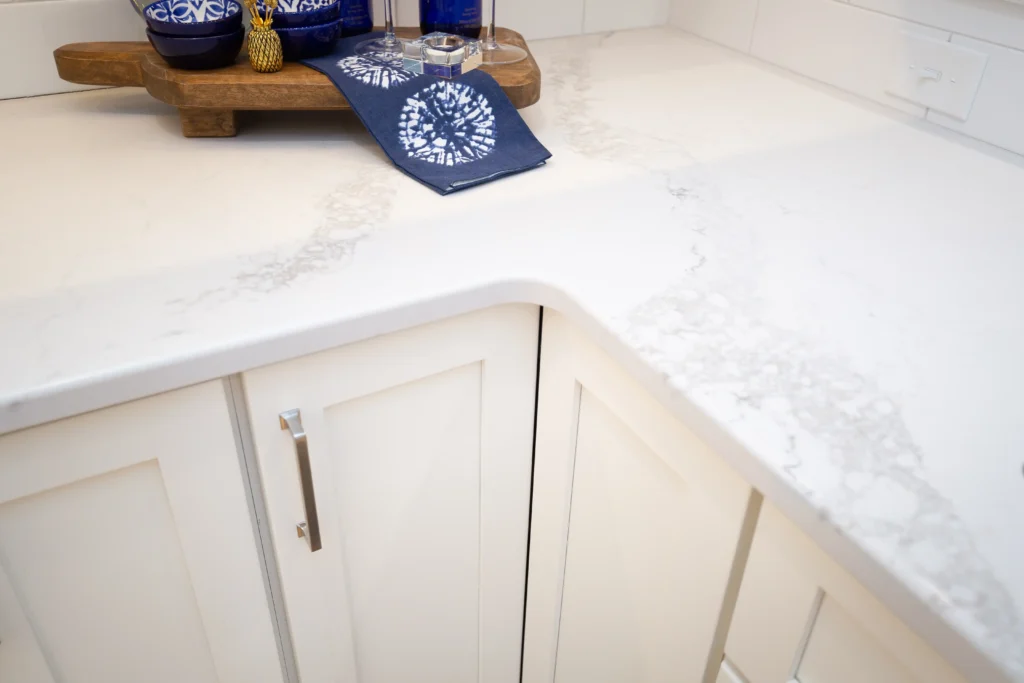Most homeowners hear “marble countertops” and picture timeless elegance. But here’s the catch: the pros and cons of marble depend heavily on where it’s used—kitchen or bathroom. What feels like a smart choice in one space can be frustrating in the other.
At Distinctive Surfaces, we’ve seen marble shine in some homes and fail in others. In this guide, we’ll separate the realities of marble in each environment, so you can choose wisely.
If you’re still weighing different surfaces, here’s a helpful guide on how to choose the right kitchen countertop for your space.
What are the Pros and Cons of Marble Countertops in the Kitchen?
Kitchens are where marble countertops face their biggest test. Between hot pans, constant spills, and daily prep, this isn’t just about beauty; it’s about resilience. Let’s look at where marble shines and where it struggles when used as a kitchen countertop.
Pros of Marble in the Kitchen
- Natural Beauty & Veining: Few materials match the look of white marble. Whether it’s Carrara marble, Calacatta slabs, or even statuary marble, the natural veining gives your kitchen a timeless, upscale feel. It’s why marble is a natural stone that consistently adds resale value—design-wise, it never goes out of style.
- Cool Surface for Cooking & Baking: If you bake or roll dough, you’ll notice marble’s surface stays cooler than room temperature. That makes a marble countertop especially appealing to home bakers. Function meets form here—an elegant surface that’s also practical for pastry work.
- Luxurious Appeal Compared to Other Materials: Even compared to granite countertops or quartz countertops, marble carries a level of luxury that’s hard to replicate. Its veining patterns and polished finish are often imitated but rarely matched. For many homeowners, this is reason enough to choose it for their kitchen countertops.
Want to explore finishes beyond Carrara and Calacatta? Check out the different types of marble and marble finishes available in Albany.
Cons of Marble in the Kitchen
- Staining: Here’s the biggest kitchen drawback: marble is porous by nature. That means your white marble will stain easily from red wine or juice if not sealed properly. Even with a sealer, spills need quick cleanup.
- Etching & Scratches: Acidic foods don’t just stain—they etch. Etching leaves dull spots on a polished marble surface, and because marble is a softer stone, scratches from knives or dropped utensils are common. It’s simply less forgiving than materials like granite.
- Maintenance Commitment: Choosing marble means accepting the care that comes with it. Regular sealing, special cleaners, and daily attention are required to maintain your marble. Some homeowners embrace the patina that develops; others find it too much work.
That’s the kitchen reality—but marble in bathrooms lives differently. There, you won’t face hot pans or constant cooking spills, though marble’s porous nature still matters. Let’s look at the pros and cons of marble countertops in the bathroom.
Curious how marble stacks up against other stones? Here’s a look at the durability of quartz vs granite in New York kitchens.
Pros and Cons of Marble Countertops in the Bathroom
Bathrooms bring out a different side of marble countertops. Without the heat and heavy food spills of a kitchen, marble has a chance to shine—but its porous nature still shapes the experience. Here’s how the pros and cons of marble play out in this setting.
Pros of Marble in the Bathroom
- Luxury Aesthetic in the bathroom: From Carrara marble countertops to bold Statuary marble, nothing creates a spa-like look quite like marble. Homeowners often choose it simply for the atmosphere it brings—a sense of elegance and timelessness that few countertop materials can match.
- Variety of Finishes: Bathrooms allow more flexibility with finishes. Honed marble gives a softer, matte look and resists etching more than polished marble, while polished surfaces create that high-shine luxury feel. Either way, marble offers a finish to match your bathroom style.
For inspiration beyond marble, see the most popular natural stone choices for bathroom countertops in Albany.
Cons of Marble in the Bathroom
- Porous Nature Still Matters: Even without wine or juice, bathrooms aren’t risk-free. Makeup, lotions, toothpaste, or even nail polish can stain a marble surface if not cleaned quickly. The porous nature of marble makes vigilance important, even here.
- Scratches & Etches: Marble is a softer stone, and acidic products, like some cleansers or hair dyes, can etch the surface. Over time, this can dull the polish, especially on white marble varieties.
- Upkeep: While bathrooms avoid food-related messes, they still demand proper care. Gentle cleaners and regular sealing are part of maintaining marble’s beauty. Skipping these steps makes it vulnerable to long-term damage.
Whether in a kitchen or bathroom, marble brings undeniable beauty, but it also comes with trade-offs.
If you’re planning a remodel, here’s a guide to finding kitchen countertops in New York that balance beauty with easier maintenance.
Ready to Decide on Marble Countertops?
Still weighing the pros and cons of marble countertops for your kitchen or bathroom? At Distinctive Surfaces, we’ll help you choose the right countertop material for your lifestyle. Visit our Round Lake showroom or schedule a no-pressure consultation today.
FAQs
Is marble good for kitchen countertops?
Marble countertops bring unmatched beauty and elegance to a kitchen, but they require more care than granite or quartz countertops. Marble is porous and can stain or etch from spills, heat, and acidic foods. With sealing and proper maintenance, however, marble remains a practical yet luxurious kitchen countertop choice.
Is marble a good choice for bathroom vanities?
Yes, marble countertops are a popular option for bathroom vanities because they resist water better than food-related spills. With proper sealing, marble holds up well against moisture while offering timeless beauty. However, products like toothpaste or lotions can still stain a marble surface, so care is needed.
Does marble stain more than granite or quartz?
Yes, the porous nature of marble makes it more prone to staining than granite or quartz countertops. Liquids like wine, coffee, or lemon juice can seep in and leave marks. Granite resists better with sealing, while quartz is nonporous, making it the most stain-resistant countertop material of the three.
What types of marble are best for homes (Carrara vs Calacatta)?
Carrara marble countertops are more common, affordable, and feature soft gray veining, while Calacatta marble is rarer, with bold veining and a brighter white background. Both add elegance to a kitchen or bathroom. The choice depends on budget, design style, and willingness to maintain the stone.
Do marble countertops increase resale value?
Yes, marble countertops often increase a home’s resale value because of their natural beauty and timeless appeal. Buyers see marble surfaces as luxurious, especially white marble like Carrara or Calacatta. While upkeep is required, many homeowners view marble as an investment compared to other stone countertops.

